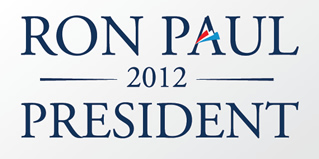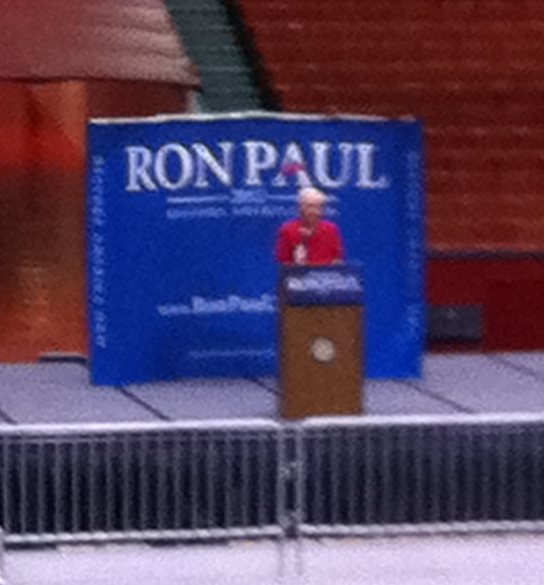
A week ago I had the opportunity to go hear Ron Paul speak in Houston, TX. In what seems to be standard operating procedure, the event was blacked out by the local media, and I only found out about it a few days before the event from a friend asking me if I was planning on attending. Admission was free and open to the public, but if you RSVP’d and printed out a ticket, you could get in thirty minutes early at 6:00 instead of 6:30. I did this and then drove into Houston, arriving at the University of Houston a few minutes before six o’clock. The line was already hundreds of people long and wrapped almost a third of the way around the large basketball stadium serving as an auditorium for the event. I had to walk for several minutes just to get to the back of the line, but I did not really mind, as it gave me the opportunity to get a look at the demographics of the attendees. While standing in line, I overheard a female student at the university saying that not even the school newspaper had mentioned the event, and that she had only learned that day about Paul’s coming to campus.
I got a pretty good seat and spent the time until 7:00 (when Paul was scheduled to begin speaking) by striking up some conversations with several people my age (mid- to late twenties) sitting near me. The story was pretty much the same for everyone: they were fairly politically apathetic until they learned about Ron Paul, they had grown sick of politicians making campaign promises and then doing the opposite when elected, they were tired of being told the country was doing just fine when we are obviously in deep trouble, and they had faith in Ron Paul as a fundamentally good and honest man, even if they did not completely agree with all his views.
I estimated that there were over 3,000 people in attendance. After the event, I looked up the stadium’s seating capacity, which turned out to be just under 9,000. Since we filled about 75% of the half of the stadium we were occupying, this figure seems accurate. Ron Paul’s son, Ronnie Paul, introduced the Paul clan that was in attendance (about a third of the whole family), which was followed by the singing of “America the Beautiful.” Next, the leader of the University of Houston chapter of Youth for Ron Paul arose and introduced himself. He confessed that he had voted for Barack Obama in 2008, based on Obama’s promises to end the wars and protect civil liberties. He declared that he would not be making that mistake again, which was why he supported Ron Paul as the only candidate who would truly end the wars, protect our liberty, balance the budget, and restore the federal government to its proper role. After this, Ron Paul entered and the crowd went wild; nothing could be heard for a solid two or three minutes except for clapping, cheers, and chants of “Ron Paul!”, “Freedom!”, and “President Paul!”

Ron Paul speaking at the event. Yeah, the camera on my phone isn't that good at long distances.
Unfortunately, Ron Paul is not the most eloquent of speakers. He often stutters slightly and then changes what he was going to say. However, since he speaks the truth, most people do not mind; he can be contrasted with Gingrich or Romney, where Paul’s importance is in the message and rather than the delivery. Paul’s speech was pretty standard fare if you have listened to many of his YouTube clips or Republican debates: we ought to protect our civil liberties from the growing federal police state, end the unnecessary and unconstitutional wars by bringing our troops home, massively cut the federal budget in order to balance it and begin a policy of fiscal sanity, and reduce the federal government down to its intended size, transferring power back to the states and the people. Ron Paul was roundly cheered on all points.
All of this is very good, and I wholeheartedly agreed with most of it. The main problems with his speech arose, as they usually do, from his libertarianism’s fanatical individualism and rejection of any group identity or interests as illegitimate. To paraphrase, Paul basically stated that “freedom” meant freedom for everyone, even people who were going to use that freedom in ways we did not like, and that in a free society, we had to accept that that was going to happen as the essence of tolerance. But this is, of course, completely unworkable. For example, you cannot have a town where half of the people believe that abortion is a fundamental right, the other half believes that abortion is infanticide, and they just “tolerate” each other’s “freedom” in peace. Whether or not the there is an abortion clinic in the town is an unavoidable fight which one or the other side is going to lose and be furious about; there is no room on either side for compromise or “tolerance.” There never can be, and to hold such a position is at best naive.
Now, I am certainly not advocating totalitarianism. There are many many things which should be left up to the individual’s freedom of choice: what to wear, what to eat, whether or not to drink alcohol, how to allocate income, the rules for one’s children at home, what leisure activities to pursue, where to live, and on and on. However, there are also activities which greatly affect the community as a whole. These are addressed in the Biblical civil law and the principles derived from them, specifying the types of things in which the state has not only a right but a duty to intervene. This list includes rape, murder, infanticide, public homosexuality, border protection, fraud, theft, arson, blasphemy, idolatry, and the like. There is no room for “tolerance” in these areas, and to suggest otherwise is fundamentally unchristian and unsupported by Scripture.
This is why Ron Paul’s coalition is only workable on a national level and has primarily only negative power. Much of Ron Paul’s platform is the reduction of the sphere of the federal government and the return of jurisdiction to the states, that is, the negative (destructive) power to demolish the bloated, monstrous, unconstitutional federal establishment. However, once this is accomplished, Paul’s coalition has little or no positive (constructive) power to deal with these issues on the state level, because the people in Paul’s coalition often have diametrically opposed views on these issues. While the majority of the crowd consisted of conservative-looking, young white people (perhaps sixteen to thirty-five years old), there was also significant representation by Muslims, homosexuals, hippies, Mexicans, Asians, and OWS types. Does anyone really believe that these diverse groups could come to a consensus on anything at a state level? Take homosexual unions for an example: the vast majority of these groups would agree that homosexual unions should not be something in which the federal government should be involved. Yet once it becomes a state issue, the liberals will want homosexual unions officially recognized, the conservatives will want homosexual unions outlawed, and the libertarians will want marriage completely left up to individuals — and there goes Ron Paul’s coalition.
I am not necessarily saying that this is a bad thing; in fact, I view this as positive in many ways. Conservatives lost the ability to win battles on a national level a long time ago, but as we have recently seen with the Arizona immigration bill and the constant proposing and passing of pro-life and anti-homosexual union bills by states, we can still win at the state level in the majority of the country if the ninth and tenth amendments were taken seriously. And would it not be infinitely better for abortion to be outlawed in thirty or thirty-five or forty states than legal in all fifty? This is why I and many others continue to support Ron Paul, not because we see Ron Paul as some great savior, or because he is perfect, or because his coalition is ideal as an end in itself, but because the coalition is a means to an end — the resurrection of states’ rights, godly state and local government, and the destruction of the tyrannical federal government.
| Tweet |
|
|
|




